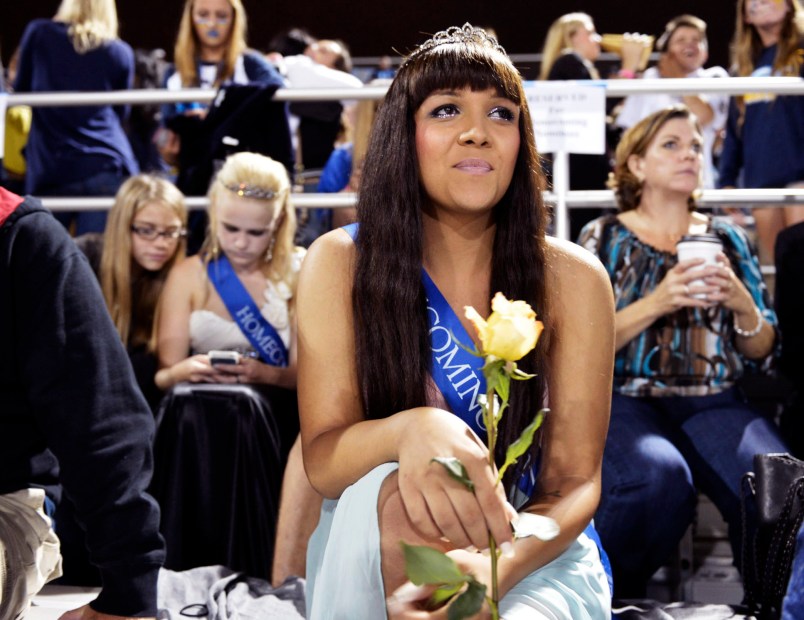SAN FRANCISCO (AP) — With a law that spells out the rights of transgender students in grades K-12 set to take effect in California, school districts are reviewing locker room layouts, scheduling sensitivity training for coaches, assessing who will sleep where during overnight field trips and reconsidering senior portrait dress codes.
But administrators, counselors, teachers and school board members also are watching and waiting. The law, the nation’s first requiring public schools to let children use sex-segregated facilities and participate in the gender-specific activities of their choice, could end up suspended within days of its Jan. 1 launch if a referendum to repeal it qualifies for the November ballot.
To obtain a public vote on the law, passed by the legislature and signed by Gov. Jerry Brown, a coalition of conservative groups called Privacy for All Students has collected hundreds of thousands of signatures. Counties have until Jan. 8 to verify them through random spot-checking.
Depending on how many are found to be valid, the secretary of state will approve the referendum, determine that it failed or order a review of every signature.
“We don’t know what’s going to happen when kids come back from their holiday vacation,” said Republican state Sen. Steve Knight, who voted against the law. “Are there going to be 15-year-old girls talking in the bathroom and in walks a boy? What are they going to do? Scream? Run out?”
The California School Boards Association is acting on the assumption that the law will stand and that, even if it does not, existing state and federal anti-discrimination laws, as well as year-old California Interscholastic Federation rules under which athletes may petition to play on a sports team that does not correspond with their biological sex, already compel schools to accommodate transgender students.
The association has advised schools to handle requests on a case-by-case basis and with parental input, if possible, but to be prepared to make private changing arrangements both for transgender students and for classmates who might object to dressing with them.
“We did strike a balance between the sensitivities associated with gender identity, not only for those students who experience a change in their gender status but the students who would be in the same facilities, in the same classrooms and on the same teams,” General Counsel Keith Bray said.
Parent Christy Musser said she plans to take two of her three school age children out of public schools in Southern California.
Her oldest son will remain in the high school where he is a sophomore, but Musser said her eighth-grade daughter feels so uncomfortable about a transgender student coming into the restroom or locker room that she distributed flyers about the referendum at school.
“At this time in their lives, these kids are young, innocent and are just learning about themselves and their bodies, and they don’t need to worry about boys coming in the locker room and looking at them, or vice versa,” she said.
San Diego school board president, Kevin Beiser, said those fears are unfounded. In the absence of statewide guidance, schools have been dealing with this challenge “in a very delicate, thoughtful and compassionate manner for many years,” he said.
“This idea that schools will let a student walk into whatever bathroom they want is baloney,” said Beiser, who works as a high school math teacher in a neighboring district.
The possibility that the law could be overturned worries Ashton Lee, 16, a junior at Manteca High School in the San Joaquin Valley. Born a girl, Ashton told his parents and school administrators his sophomore year that he was transgender.
But he said school officials balked when he asked to be transferred from an all-girls aerobics class to a team sports class for boys. “They didn’t understand the seriousness of the issue I was dealing with,” he said. “They treated it like a normal thing, like I didn’t like the class or was bored with the teacher.”
Ashton lobbied for the law last spring and thinks his public activism helped persuade Manteca High to acknowledge his gender identity when school resumed in August. He now is allowed to use the boy’s restrooms and locker rooms and to wear the junior ROTC uniform for male cadets.
Similar adjustments have been made for five transgender classmates.
The law’s passage “showed them this is OK, this is going to be happening in a lot of other places,” he said. “If it gets taken away, I’m kind of worried my school will be like, ‘Well, we don’t have to do it anymore.”
California’s law comes amid legal challenges across the country involving transgender students filing actions for the right to use facilities that match their expressed identities.
In June, the director of Colorado’s civil rights board ruled in favor of a 6-year-old transgender girl who had been prevented from using the girl’s bathroom at school. The next month, the Arcadia Unified School District in California agreed to train its staff on transgender issues to settle a complaint brought by a student prevented from staying with other boys during a school-sponsored overnight science camp.
The San Francisco Unified School District has had a policy similar to the new law since 2003. The Los Angeles Unified School District — the state’s largest — has had one since 2005. This month, the school boards in Berkeley, Sacramento and Pacifica followed suit.
Namita Brown, an Oakland lawyer who represents school districts in Northern California, said educators are less concerned about installing shower screens or having enough private restroom stalls than figuring out a way “to tone the fervor in the parent community.”
“The bottom line is districts are in this impossible place where our primary job is to offer quality education and we are suddenly facing some upset constituents,” Brown said.
Copyright 2013 The Associated Press. All rights reserved. This material may not be published, broadcast, rewritten or redistributed.
AP Image: Cassidy Campbell, 16, attends the 2013 homecoming football game for Marina High School on Friday, Sept. 20, 2013 in Huntington Beach, Calif. Campbell was crowned 2013 homecoming queen for Marina High School. Upon receiving her crown, Cassidy became the Marina High School’s 50th homecoming queen and one of few transgendered teens nationwide to receive such a title.










